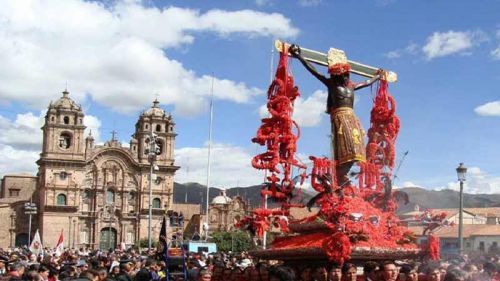Lucuma is undoubtly the most popular fruit in Peru. The native subtropical fruit, which some even name "The last gold of the Incas” and consider as the “national fruit”, is grown in the Peruvian Andes since ancient times.
Long before the Spaniards arrived in Peru, lucuma not only served as nutritious staple food, but also as ceremonial offering and was viewed as symbol of fertility and creation. Ancient Peruvian cultures, especially the Moche, often depicted fruits and vegetables in their art. So, it’s not surprising that among many others the image of lucumas can be seen on countless ceramics found at pre-Colombian ruins and indigenous burial sites in Peru.
Lucuma fruits grow on evergreen trees which can reach heights of up to 20 m (65 feet) and produce a light colored, fine grain, resistant wood (used for example for constructions at the famous ancient city of Pachacamac). On the outside the round to ovoid fruits are usually a saturated green in color. They are consumed when overripe and the skin bursts open revealing the bright to deep yellow, fibrous, creamy flesh.
Lucuma has a unique flavor which is often compared to maple, butterscotch and sweet potato. While Peruvians love lucuma, they rarely eat it fresh; it is however widely used as ingredient in ice cream (lucuma flavor is the most popular ice cream in Peru), milkshakes, smoothies, juices, puddings, cakes and desserts; adventurous eaters might even enjoy lucuma pasta or lucuma gnocchi.
Health benefits of Lucuma
Next to being delicious lucuma has numerous presumed health benefits. Due to its antioxidant, antibiotic, anti-inflammatory, antifungal and antimicrobial properties, lucuma is used in the natural medicine of Peru for centuries. It is said to boost the immune system, lower blood pressure, manage diabetes, protect against some forms of cancer, reduce inflammation, prevent signs of aging and help sun damaged skin.
Lucuma is rich in healthy carbohydrates (glucose, fructose, sucrose and inositol) and often used in powder form as natural sweetener and by diabetics as low-glycemic alternative to sugar. Furthermore, lucuma contains beta-carotene, niacin (B3), iron, calcium, zinc, vitamin C, fiber and essential trace minerals.
The oil extracted from the dark brown, glossy seeds, called lucuma nut oil, is rich in fatty acids (linoleic acid and oleic acid) and believed to help treat skin disorders and skin inflammatory conditions including for example psoriasis and eczema; it is also said to promote wound healing and to be beneficial for general skin care.





























